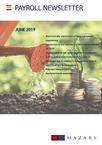
Payroll newsletter - June 2019
Electronically submission of the employment regulations
In Belgium, every employer is obliged to draw up employment regulations as soon as the employer hires one or more employees.
The employer is legally obliged to submit a copy of the employment regulations, or the adjustments, within 8 days to the authorized board of the Social Laws Inspections Service.
Since the status of a company can change, it is best to regularly check the employment regulations to make the necessary adjustments (for instance a timetable change). In the past, these changes should be transferred to the authorities via paper, but the formalities that one must complete to make these adjustments will become more easy.
From now on it is possible to submit a copy of the employment regulations of the company electronically. The access and login procedure can take place by using an electronic ID card (eID) or via Itsme.
Consequently, this way of electronic filing will result in less administrative formalities and a faster way to receive a confirmation that one have fulfilled all legal obligations.
Please contact us, in case you would like our assistance relating to the drafting of or amendment of the employment regulations or in case you have questions about the filing process.
Conversion of eco vouchers of 2020 before October 30, 2019
The collective labor agreement concerning eco vouchers for employees falling under Joint Labour Committee 200, has been concluded for an indefinite period. Consequently, as an employer (fallen under JLC 200), in principle you will have to grant eco vouchers to your employees again in (June) 2020!
However, it is also possible to reward the employees by granting another equivalent benefit instead of eco vouchers. Another equivalent benefit can be e.g. the implementation of meal vouchers or increasing the nominal value of the current meal vouchers, implementation of a collective medical expense / hospitalization insurance, …
The implementation process depends on the presence or absence of a trade union delegation within the company. Employers who want to convert their eco vouchers of 2020 into another equivalent have time until October 30, 2019!
Please contact us, in case you would like our advice or assistance relating to this conversion.
Digitalisation of the reporting of sick employees
From now on, the reporting of sick employees to the health insurance fund must be made digitally. This digitalisation will take place via the electronic declaration of social risks ("DSR/ASR").
Nevertheless, employers will still have to inform their payroll provider concerning sick employees who must be compensated by the health insurance fund. On the other hand, your employee must continue to inform the health insurance fund when he or she resumes work.
In two cases, employers must also inform the health insurance fund about resuming work by their employees: (1) the employee resumes work before the start of the benefit period of the health insurance fund or (2) the employee resumes work after a period of absence of more than 10 months. In these cases you also need to inform your payroll provider.
This digitalisation has several advantages: less paper waste, less administration and, above all, a shorter process for compensating the employees!
A third outplacement possibility in case of dismissal due to medical circumstances beyond one’s control ("force majeure")
Some dismissed employees can rely upon outplacement guidance in their search for a new job. Up till now there existed two outplacement situations:
- the 1st situation (also the general one) occurs for dismissed employees with a notice period of at least 30 weeks;
- the 2nd situation (also the specific one) occurs for dismissed employees with a minimum age of 45 years and one year of seniority.
Since April 29th, 2019 a third situation for outplacement has been introduced for dismissed employees due to medical circumstances beyond one’s control ("force majeure"). This situation concerns employees who are a victim of disability caused by a disease or an accident that prevents them to complete their job performance as agreed in their employment contract.
Please contact us for more information regarding the procedure of outplacement guidance, the terms, the duration and potential exemptions.
Parental leave is more flexible
The Royal Decree of May 5, 2019 provides an amendment to various provisions concerning thematic leaves. It mainly involves changes concerning parental leave and the leave for medical assistance.
Since June 1, 2019 employees can apply for parental leave with their employer in a more flexible way.
Employees who work full-time have the possibility to reduce their work performance by 1/10 during a 40-month period, with the permission of the employer. The 40-month period can be split into periods of 10 months or a multiple of 10. Consequently, a full-time employee can reduce his or her work performance by 1 day every two weeks or half a day per week.
In addition, it is also possible to take full-time and half-time parental leave in a more flexible way. The parental leave in the form of complete suspension of performance can be split into periods of a week or multiples of 1 week. The parental leave in the form of half-time suspension of performance can be split into periods of a month or multiples of 1 month.
Flexibility for medical assistance leave is only applicable in case of full-time leave. The former minimum duration of 1 month can be shortened to 1 week, 2 weeks or 3 weeks.
For more information about the practical application of these changes, please contact us.
Recruitment and dismissal of staff during the absence of the employer
In principle, an employer (legal person or natural person) decides on the recruitment and dismissal of an employee. In the absence of the director or responsible of the employer and in particular during his vacation, no decision to recruit and / or dismiss employees can be taken, not even due to special circumstances such as an extraordinary increase of work in the company or a clear urgent reason for dismissal without term of notice or reimbursement.
To prevent that no decision can be made during the absence of the director or responsible of the employer, the employer has the option to delegate the power of authorization to a third party. In other words, appoint a representative to act on behalf of the employer. This kind of delegation of employer’s authority is very important to avoid a void dismissal.
If you want more information about the practical matters and arrangements to implement this delegation of powers, please don’t hesitate to contact us.
Business travel expenses
Expenses proper to business travels could be reimbursed on a lump sum basis under certain conditions. If the employee (or the director) does not receive a company car and uses his own vehicle for business travels, the employer may grant the employee a lump sum allowance to cover his expenses proper to the use of his own vehicle for professional purposes.
The reimbursement of these business expenses can be done in two ways:
- Reimbursement upon expense notes based on the actual expenses incurred;
- Reimbursement of a fixed mileage allowance (0,3573 EUR) per kilometer (amount until June 30, 2019).
Please note that the lump sum allowance is determined by the Belgian government each year in July. At this moment, the allowance of 2019 is not yet published in a circular letter. With reserve of publication as from July 1, 2019, the update amount will be equal to 0,3653 EUR per kilometer.
Don't miss the deadline! For all dates, please click here

